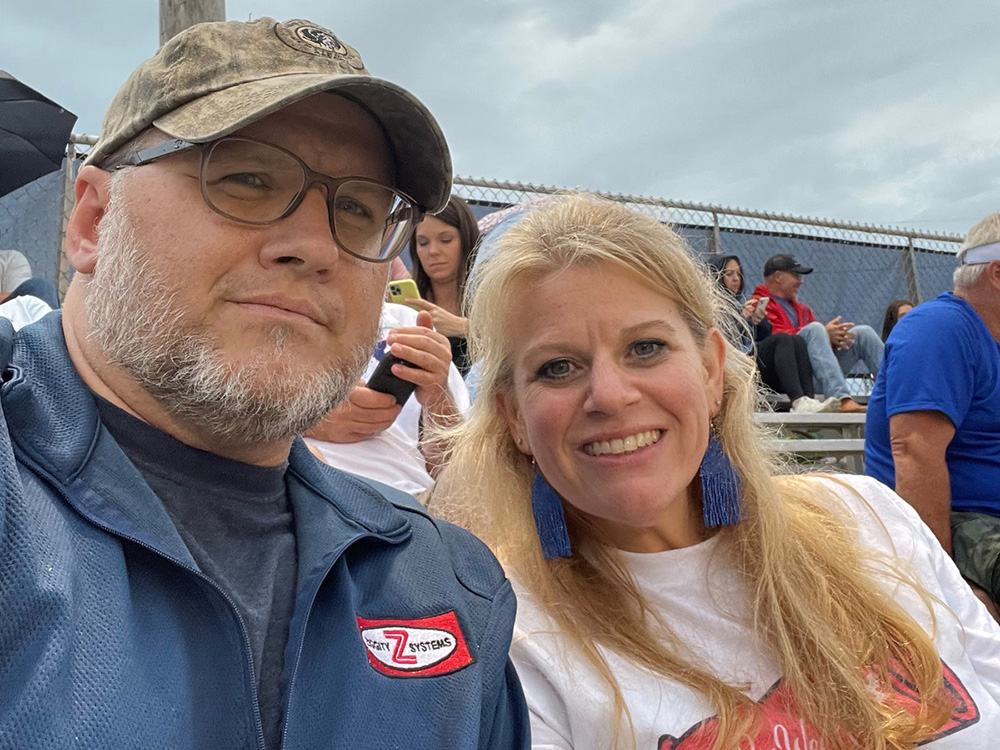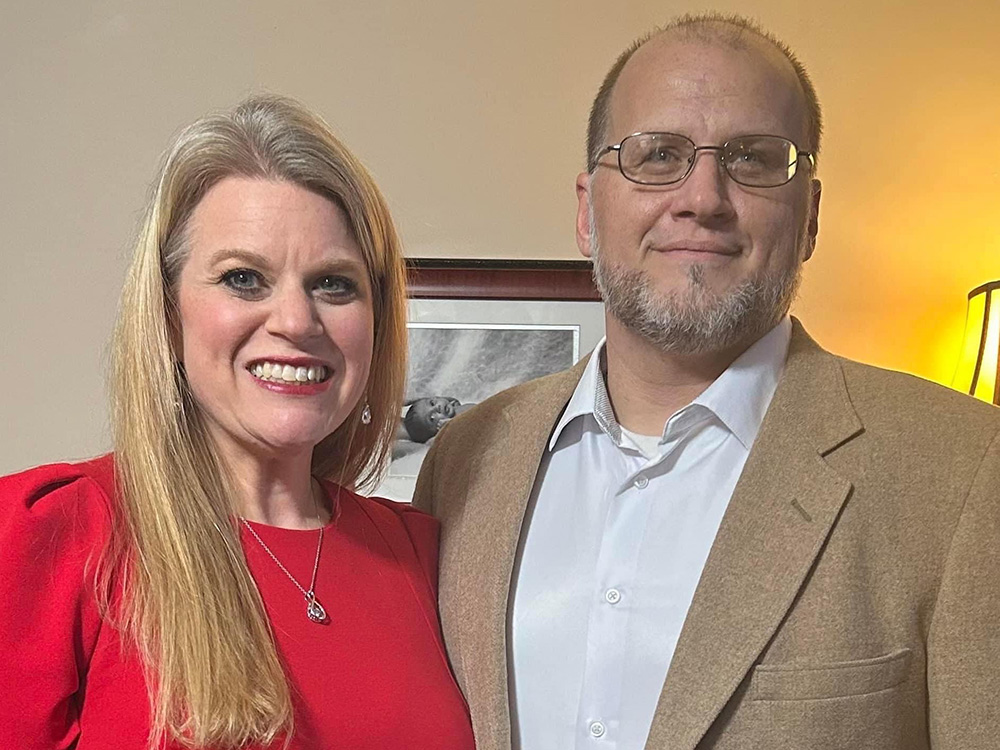Dee Dee’s story
5 things I wish I would have known: caring for my spouse with gastroparesis
Dee Dee and her husband Shannon had been married for almost 10 years when he was diagnosed with gastroparesis in 2010. Now, nearly 15 years later, Dee Dee opens up about her journey as a caregiver in the hopes that it can help others.

Shannon, Enterra® Therapy patient with his wife Dee Dee
#1 Grief is a part of surviving gastroparesis
When my husband Shannon first got sick, we had been together almost 13 years. And until that point, he and I were always a team. We’d start our day out together, we’d meet every day for lunch, we’d spend every night together. When he got sick, I felt like I had lost my companion.
It’s hard for me to admit, but I realize now that for probably the first three years of Shannon’s illness, I lived in denial. I thought, “This is something short-term. We’re going to get over it, we’ll find a treatment and everything will get back to normal.” I don’t think I wanted to accept that our life was going to be completely different.
But after a while it started to sink in that his illness was not going to end quickly; that it was going to be life altering.
Looking back, I realize I had started to grieve our old life—grieve who he was when we first got married—because this illness took him away from us. I felt like I was losing who I had married, who I had fallen in love with. That was very difficult.
But eventually, I went through the stages of grief and I finally made it to acceptance— realizing that things aren’t going to be normal, but that’s okay because we’re going to be okay. We’ve had to learn to make adjustments, but we’ve made it through.
#2: What gastroparesis would look like for us
Looking back, I wish I would have known what gastroparesis was really going to look like.
For the first 6 months of his illness, Shannon spent at least one week a month in the hospital. He would have good days—and then all of a sudden he’d have to be hospitalized for dehydration.
The medical team at our hospital was not well educated on gastroparesis, so they would keep him in the hospital for days trying to figure out what was going on. They were constantly testing, but couldn’t give us any answers. So early on, every time he had a major flare-up, we would think, “Something must be seriously wrong, but they just haven’t found it.” That was scary.
I don’t feel like I was ever given a clear picture of what gastroparesis should look like, or normally does look like, so that I could know what to expect. I wish there would have been someone, like another caregiver or patient, who could have told me, “Everybody’s different, but these are some of the things you can expect going into this.”
Now that we’ve lived through it, we know how to recognize a flare-up, but early on, we just didn’t know what to do.
#3: How to care for myself—as a caregiver
I really wish I could have found a support group, because in the early days, we didn’t know anybody who had experienced any illness like gastroparesis. If I could have had that camaraderie, that opportunity to be around people who were walking through the same journey as me, I don’t think I would have felt so isolated.
Because during that time, I felt like I didn’t have anybody that I could depend on.
And so this experience really strengthened my faith. I had to really depend on it, because Shannon just wasn’t physically able to help me in all the ways he had the first 15 years of our relationship. I didn’t want to burden him with anything I was going through.
I remember staying in the hospital with Shannon, and seeing how much he was suffering and how much pain he was in. He went through unbelievable suffering and pain and loss.
So every morning, even when Shannon was very sick and I had so much on my plate, I would wake up early, before everybody else, and spend 15 or 20 minutes praying. And I think without that, things would have been a lot more difficult.
#4: How to ask for help
Something I wish I would have done better was explaining to our family how sick Shannon really was.
We eventually moved back to be close to family, and they were willing to step in and help, but I wish I would have let them in more.
For example, when we had a family gathering and Shannon would have to stay home, I’d just say, “He’s not feeling well.”
I think if I would have done a better job of explaining how sick he was, our families would have been more willing to reach out and help. But instead, we put on a happy face and pretended like things weren’t as bad as what they really were.
To be honest, though, I don’t even think that I realized how sick he was until after he started getting better. Once he received his Enterra System and started getting healthier, I looked back at pictures from before, and that’s when I realized how terrible he looked.
But as we were in the thick of it—so overwhelmed and consumed with making it through daily life—I didn’t realize just how bad it was.

#5: How it would change me
It’s kind of crazy—even now, when we have conversations and look back, everything is phrased in terms of before and after Shannon got sick.
I think that, before he got sick, I more or less lived in my own perfect, little world. Things had always gone the way I thought they would. Shannon’s journey with gastroparesis has opened my eyes to some of the pain and suffering that people are struggling with.
Now, when I meet people who are dealing with chronic illness or going through a hard time with their spouse or loved one, I’m definitely able to lend a listening ear. I’m able to offer words of encouragement and advice—reminders to be patient and understanding—or whatever they might need.
This is definitely not how we thought that our life was going to end up. But I also know that we both feel like our marriage is stronger because of it. We’re more open to rely on one another than we were before. I know that I can depend on him and that he can depend on me. We know that we have each other as support.
But looking back, I can finally see that this whole experience has definitely made me a stronger person.
Shannon’s experience is unique to him and individual results may vary.
IMPORTANT SAFETY INFORMATION
Enterra Therapy for treatment of chronic, resistant to medication nausea and vomiting associated with gastroparesis caused by diabetes or an unknown origin in patients aged 18 to 70 years: patients should always discuss potential risks and benefits of the device with their physician.
*HUMANITARIAN DEVICE
Authorized by Federal law for use in the treatment of chronic intractable (drug refractory) nausea and vomiting secondary to gastroparesis of diabetic or idiopathic etiology in patients aged 18 to 70 years. The effectiveness of this device for this use has not been demonstrated. What does this mean?
